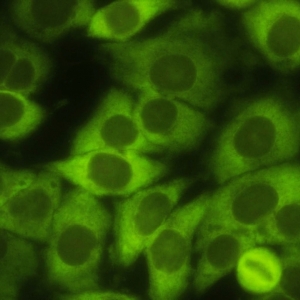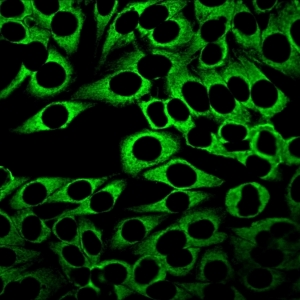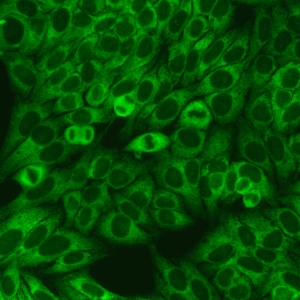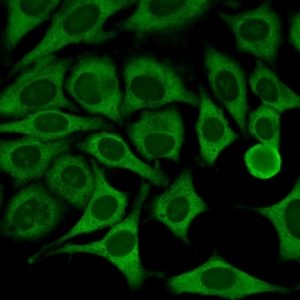AC-19 - Dense Fine Speckled
Descrição
"anti-synthetase syndrome", PM/DM, SLE, juvenile SLE, neuropsychiatric SLE
Associação Antigênica
PL-7, PL-12, ribosomal P proteins
Doença Associada
"anti-synthetase syndrome", PM/DM, SLE, juvenile SLE, neuropsychiatric SLE
Relevância Clínica (Primeiro Nível)
Found in patients with SLE and the anti-synthetase syndrome (a subset of AIM), interstitial lung disease, polyarthritis, Raynaud’s phenomenon, and mechanic’s hands; these features may occur in various combinations or as an isolated manifestation, especially interstitial lung disease.
If SLE is clinically suspected, follow-up tests for antibodies to ribosomal P phosphoproteins (P0, P1, P2, C22 RibP peptide) are recommended; these antigens may be included in the routine ENA profile.
Anti-RibP antibodies have been associated in some studies with neuropsychiatric lupus, and in childhood-onset SLE with autoimmune hemolytic anemia.
If AIM, in particular the anti-synthetase syndrome, is suspected, it is recommended to perform follow-up tests for antibodies to tRNA synthetases; antigens are included in disease specific immunoassays (ie, inflammatory myopathy profile).
If AIM, in particular necrotizing myopathy, is suspected, it is recommended to perform follow-up tests for anti-SRP antibodies; the antigen is included in disease specific immunoassays (ie, inflammatory myopathy profile).
The fine distinction between AC-19 and -20 may depend on HEp-2 substrates and/or antibody concentration; antibodies to both RibP as well as tRNA synthetases may be undetected in HEp-2 IIFA-screening.
Relevância Clínica (Segundo Nível)
Anti-RibP antibodies have been reported in 10% of AIH patients without clinical or laboratory evidence of SLE
The prevalence of anti-RibP antibodies in SLE has been reported to range between 8 – 35% in a multicenter study
Less than 60% of the sera positive for anti-RibP antibodies have the AC-19 pattern at serum screening dilutions of 1/80 or higher; the coexistence of a weak nucleolar staining is relatively common
Less than 50% of sera having anti-tRNA synthetase antibodies have an AC-19 pattern at serum screening dilutions of 1/80 or higher
Most reports describing clinical association of anti-RibP antibodies do not actually show correlations with the AC-19 pattern as such.
Referências
Betteridge Z, McHugh N. Myositis-specific autoantibodies: an important tool to support diagnosis of myositis. J Intern Med 2016;280:8–23.
Calich AL, Viana VS, Cancado E, et al. Anti-ribosomal P protein: a novel antibody in autoimmune hepatitis. Liver Int 2013;33:909-13.
Fritzler MJ, Choi MY, Mahler M. The anti-nuclear antibody (ANA) test in the diagnosis of anti-synthetase syndrome and other autoimmune myopathies (AIM). J Rheumatol 2018;45:444-5.
Mahler M, Kessenbrock K, Szmyrka M, et al. International multicenter evaluation of autoantibodies to ribosomal P proteins. Clin Vaccine Immunol 2006;13:77–83.
Mahler M, Kessenbrock K, Szmyrka M, et al. International multicenter evaluation of autoantibodies to ribosomal P proteins. Clin Vaccine Immunol 2006;13:77-83.
Satoh M, Tanaka S, Ceribelli A, et al. A comprehensive overview on myositis-specific antibodies: new and old biomarkers in idiopathic inflammatory myopathy. Clin Rev Allergy Immunol 2017;52:1–19.
Sciascia S, Bertolaccini ML, Roccatello D, et al. Autoantibodies involved in neuropsychiatric manifestations associated with systemic lupus erythematosus: a systematic review. J Neurol 2014;261:1706–14.
Valo?es CC, Molinari BC, Pitta AC, et al. Anti-ribosomal P antibody: a multicenter study in childhood-onset systemic lupus erythematosus patients. Lupus 2017;26:484–9.
Yura H, Sakamoto N, Satoh M, et al. Clinical characteristics of patients with anti- aminoacyl-tRNA synthetase antibody positive idiopathic interstitial pneumonia. Respir Med 2017;132:189–94.






